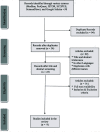COVID-19 Pandemic, Risk, and Blame Attributions: A Scoping Review
- PMID: 35656422
- PMCID: PMC9125468
- DOI: 10.1177/02537176221091675
COVID-19 Pandemic, Risk, and Blame Attributions: A Scoping Review
Abstract
Background: The COVID-19 pandemic and its associated psychological distress led people to engage in attributing several health-related behaviors and consequences at the community and international levels. A scoping review was conducted to explore the existing literature on the use of attribution theory in understanding the psychological phenomena underlying health-related behavior and consequences during the pandemic.
Methods: We conducted the literature review using Arksey and O'Malley's methodological framework for scoping review. Studies were identified through a comprehensive search of the following six databases: MEDLINE through PubMed, ProQuest, JSTOR, Scopus, ScienceDirect, and Google Scholar. All databases were searched for entries in English from September 2019 to September 2021 to correspond to the advent of the pandemic.
Results: Several elements influence attributions and the influences of the attributions on people's responses to information and the consequences of attributions in influencing people's responses to information and behavior changes in the context of the COVID-19 pandemic. The importance of attribution errors leading to stigmatization and responsibility framing, both crucial for implementing pandemic control measures and enhancing psychological well-being, were also highlighted.
Conclusion: More research is needed in this field to inform people-centered policies and pandemic preparedness plans to mitigate the potentially devastating psychosocial consequence of the pandemic or other public health emergencies.
Keywords: COVID-19; attribution; blame; well-being.
© 2022 Indian Psychiatric Society - South Zonal Branch.
Conflict of interest statement
Declaration of Conflicting Interests: The authors have no potential conflicts of interest to declare with respect to the research, authorship, and/or publication of this article.
Figures
Similar articles
-
"Snapping, sharing and receiving blame": A systematic review on psychosocial factors of victim blaming in non-consensual pornography.Ind Psychiatry J. 2024 Jan-Jun;33(1):3-12. doi: 10.4103/ipj.ipj_166_23. Epub 2024 Feb 16. Ind Psychiatry J. 2024. PMID: 38853810 Free PMC article. Review.
-
The COVID-19 pandemic and healthcare systems in Africa: a scoping review of preparedness, impact and response.BMJ Glob Health. 2021 Dec;6(12):e007179. doi: 10.1136/bmjgh-2021-007179. BMJ Glob Health. 2021. PMID: 34853031 Free PMC article.
-
Beyond the black stump: rapid reviews of health research issues affecting regional, rural and remote Australia.Med J Aust. 2020 Dec;213 Suppl 11:S3-S32.e1. doi: 10.5694/mja2.50881. Med J Aust. 2020. PMID: 33314144
-
Enhancing the scoping study methodology: a large, inter-professional team's experience with Arksey and O'Malley's framework.BMC Med Res Methodol. 2013 Mar 23;13:48. doi: 10.1186/1471-2288-13-48. BMC Med Res Methodol. 2013. PMID: 23522333 Free PMC article.
-
Mental health consequences of COVID-19 pandemic among college students and coping approaches adapted by higher education institutions: A scoping review.SSM Ment Health. 2022 Dec;2:100122. doi: 10.1016/j.ssmmh.2022.100122. Epub 2022 May 29. SSM Ment Health. 2022. PMID: 35665095 Free PMC article.
Cited by
-
The first-to-test bias: Impact of testing order on assigning responsibility for contagion.PLoS One. 2024 Mar 14;19(3):e0297965. doi: 10.1371/journal.pone.0297965. eCollection 2024. PLoS One. 2024. PMID: 38483925 Free PMC article.
-
The driving mechanism of citizens' protective behaviors for rainstorm flood disasters in China: An empirical study based on the protection motivation theory and protective action decision model.Heliyon. 2024 Sep 28;10(22):e38482. doi: 10.1016/j.heliyon.2024.e38482. eCollection 2024 Nov 30. Heliyon. 2024. PMID: 39624318 Free PMC article.
-
A cross-sectional study of COVID-19 testing and disclosure hesitancy: The role of responsibility attribution in South Korea.PLoS One. 2025 Aug 21;20(8):e0330737. doi: 10.1371/journal.pone.0330737. eCollection 2025. PLoS One. 2025. PMID: 40839661 Free PMC article.
References
-
- Arora T, Grey I, Östlundh L, et al.. The prevalence of psychological consequences of COVID-19: A systematic review and meta-analysis of observational studies. J Health Psychol, 2022; 27(4): 805–824. - PubMed
-
- Kumar A and Nayar KR. COVID-19 and its mental health consequences. J Ment Health, 2021; 30(1): 1–2. - PubMed
-
- Haokip T. From ‘Chinky’ to ‘Coronavirus’: Racism against Northeast Indians during the COVID-19 pandemic. Asian Ethnicity, 2021; 22(2): 353–373.
Publication types
LinkOut - more resources
Full Text Sources
Research Materials


